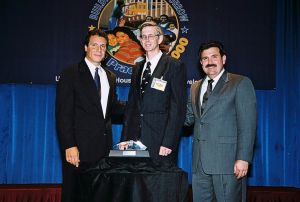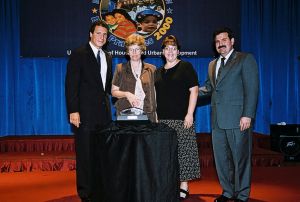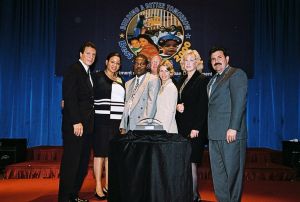 |
2000 Best Practice Awards
Best of the Best Winners: New York
Best Practice: Schenectady Inner City Ministry
Inner City Ministry Draws on 53 Congregations
to Address Concerns of Low- and Moderate-Income Residents
Schenectady, New York. The Schenectady Inner City Ministry (SICM) is an
ecumenical partnership of 53 congregations working together to “relate
the resources of the churches to the human needs of the city.” SICM
initiates programs of joint service on behalf of member congregations to
address critical concerns affecting and involving low- and moderate-income
residents of Schenectady, New York. SICM serves more than 30,000 individuals
each year through its various programs.
SICM’s projects typically involve developing
and spinning off projects, using volunteer resources extensively and defining
the |

Rev. Phillip Grisby (c) receiving Best of
the Best award from Secretary Cuomo (l) and Deputy Secretary Ramirez (r) |
project so that a real difference can be made
in a reasonable amount of time. SICM traditionally has developed programs
to meet community needs, nurtured those programs along and then, when appropriate,
spun them off to other organizations or to independence. Locally well known
spin-offs include Project SAFE and SAFE HOUSE (outreach to prostitutes and
runaway youth), Bethesda House (downtown day shelter for the homeless) and
Hill and Vale Affordable Housing (a community land trust).
Current SICM initiatives include the following:
- The county's largest emergency food pantry,
which is a model pantry run primarily by volunteers but serving 25,000
annually.
- The Damien Center, a drop-in center for
people infected with and/or affected by HIV/AIDS, which serves over 180
peoples a year.
- A neighborhood-based job placement, information
and referral center, called JOBS etc. JOBS places 300+ people a year in
jobs. JOBS recently received the "Human Services Program of the Year"
award from the Council of Community Services, a statewide group.
- Save and Share, a food-buying co-op, which
saves participants significantly on first quality food and is especially
helpful to the marginal, lower-waged worker and seniors provided an average
of 329 units of discounted groceries each month.
- An appliance matching service, run by volunteers,
that directly links persons wanting to donate appliances with those needing
them.
- A growing summer youth lunch program, located
in city parks and at some congregational sites, which provides approximately
30,000 lunches over a 7 week period.
- SCITT, a teen improvisational and educational
theater troupe that does skits written by teens on such topics as drug
prevention, relationships, AIDS prevention, parents, and the like. SCITT
has received several awards.
- Coalition building on public issues with
and on behalf of the churches in areas affecting inner city communities.
- A Housing Task Force that administers a
revolving loan fund for security deposits, approved 45 security deposit
loans last year. In addition, it also coordinates housing developers and
providers, and advocates for improved public policies on housing.
SICM can be replicated through partnerships
among congregations in any community, along with nonprofit organizations
and government agencies. In addition to its programs, SICM supports several
collaborative efforts, including the Community Crisis Network (serves individuals
in crisis) and Schenectady County Embraces Diversity (a study circle project
to address racism and race relations).
Contact: Ms. Marianne Comfort, Phone: (518)374-2683
Tracking Number: 736
Winning Category: Program (Community Builder) |
Best Practice: Home
Ownership Services
Counseling Program Ensures Sustainable
Homeownership
| Rochester, New York. The Home Ownership Services Program offers assistance that
is designed to reach people in Rochester and Monroe counties with wide-ranging
concerns related to home ownership and provides services in English, Spanish
and American Sign Language. For first-time homebuyers, pre-purchase counseling
provided by the program enhances their consumer skills and walks them through
the complicated homebuying process. The program works with local lenders
to provide counseling as part of HUD’s Comprehensive Housing Counseling
Program. Senior citizens can receive |

Ann Peterson/Amy Brough receiving Best of
the Best award from Secretary Cuomo (l) and Deputy Secretary Ramirez (r) |
information and assistance on reverse mortgage
programs such as HUD’s Home Equity Conversion Mortgage (HECM)
to help people with limited incomes remain in their homes.
Acting as an advocate for homeowners facing
foreclosure, the program helps by negotiating realistic repayment plans
with their lenders and loan servicers. In addition, the program works with
the families to develop budgets and discover untapped income sources that
will assist them with meeting future payments. Qualified homeowners who
demonstrate an ability to maintain mortgage payments are offered deferred
payment loans. It also helps eligible families access mortgage relief funding
available through some of the local town’s Community Development
Block Grant funding for families who have fallen behind in their mortgages
due to circumstances beyond their control.
In 1999, the Housing Council’s Home Ownership Services Program provided
pre-purchase counseling to 178 first time homebuyers and proceeded to close
loans, allowing homebuyers to complete the purchase of their first home.
The program also counseled 317 families who were delinquent in their mortgage
payments—95 percent of whom succeeded in avoiding foreclosure.
Home Ownership Services works in partnership
with various organizations to conduct outreach in the community. Referrals
come through HUD’s FHA programs, the Consumer Credit Counseling program,
and advocates such as the American Association of Retired People (AARP).
Home Ownership Services staff also works closely with local lenders, area
governments, and senior citizens centers to keep them informed of available
services.
Contact: Anne Peterson, Phone: (716) 546-3700 Ext. 3008
Tracking Number: 443
Winning Category: Geographic |
Best Practice: StoreWorks
StoreWorks Project Creates New Housing
and Retail Space
| New York, New York. How best to handle deteriorating mixed-use properties is
an ongoing problem in urban neighborhoods. Even one unused, declining building
in an otherwise economically viable neighborhood can have a significant
impact, but finding private investors willing and able to take on the costs
of rehabilitation and financing is a challenge. One answer is the StoreWorks
Project in New York City. StoreWorks facilitates the purchase, redevelopment
and return to private ownership of vacant, deteriorated city-owned buildings.
Through StoreWorks, 35 commercial spaces and 72 affordable dwelling units
have been rehabilitated, and all have been turned over |

Recipients (c) receiving Best of the Best
award from Secretary Cuomo (l) and Deputy Secretary Ramirez (r) |
to private owners.
Before the StoreWorks Project, the neighborhood
business community—the group that was most interested in buying and
maintaining these city-owned properties—was excluded from the market
because of the high cost of development and financing. By leveraging financing
from both the public and private sectors, the project created a solution
that allows members of the community to be the driving forces in redevelopment.
StoreWorks is a collaborative partnership
among the City of New York Department of Housing Preservation and Development
(HPD), the Neighborhood Housing Services Community Development Corporation
(NHS), HUD, and the BNY Mortgage Company. In the first round of the project,
HPD sold NHS 34 properties consisting almost exclusively of buildings with
a storefront at street level and 1-8 housing units on the upper stories.
BNY Mortgage Company, Greenpoint and EAB provided private sector financing, while renovation
and permanent financing was obtained through a HUD-insured FHA 203(k) mortgage.
HPD provided additional funds through city subsidies. During the second
round, 63 mixed-use buildings with 168 dwelling units are slated for commercial
and residential renovation.
Loans for mixed-use properties are commonly
treated like commercial loans and therefore require a large down payment
and higher financing costs. These requirements exclude most small neighborhood-based
business owners. FHA’s low down payments and reduced closing costs
removed these barriers and enabled neighborhood business people to qualify.
The use of the HUD mortgage in collaboration with the BNY Mortgage private
sector financing helped solve the problem of financing mixed-use properties.
The project takes advantage of the existing
resources of all of the major partners. HPD had an inventory of deteriorated
properties and was willing to subsidize the project. NHS has development
experience, and it delivered qualified buyers through its existing
homeowner and landlord counseling. The collaboration between HUD and BNY
Mortgage designed the financing and funded the loans, enabling the rehabilitated
units to be passed on to the qualified neighborhood buyers.
The StoreWorks Project goes beyond returning
run-down buildings to the market; the project is also a force for community
revitalization. In addition to increasing the number of affordable rental
housing units, it has boosted employment, retail services and economic opportunity.
Contact: David Beer, Phone: (212) 519-2526
Tracking Number: 1971
Winning Category: Program (Housing - Single Family) |
Return to Best
Practices 2000 Best of the Best Winners
Content Archived: April 20, 2011 |